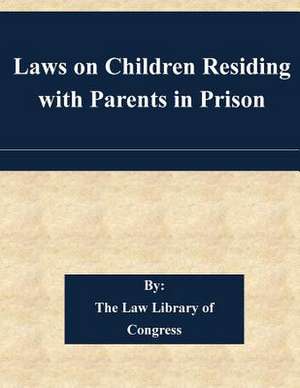Laws on Children Residing with Parents in Prison
Autor The Law Library of Congressen Limba Engleză Paperback
Preț: 85.65 lei
Nou
Puncte Express: 128
Preț estimativ în valută:
16.39€ • 17.81$ • 13.78£
16.39€ • 17.81$ • 13.78£
Carte disponibilă
Livrare economică 31 martie-14 aprilie
Preluare comenzi: 021 569.72.76
Specificații
ISBN-13: 9781507584552
ISBN-10: 1507584555
Pagini: 74
Dimensiuni: 216 x 279 x 4 mm
Greutate: 0.2 kg
Editura: CREATESPACE
ISBN-10: 1507584555
Pagini: 74
Dimensiuni: 216 x 279 x 4 mm
Greutate: 0.2 kg
Editura: CREATESPACE
